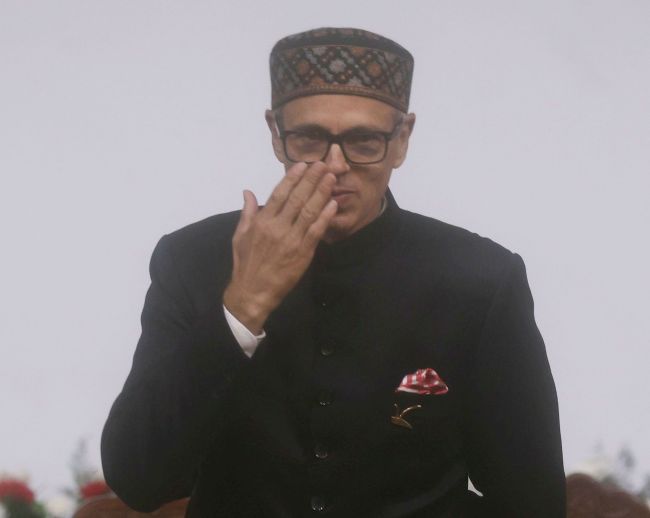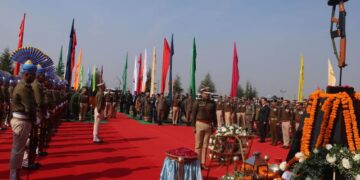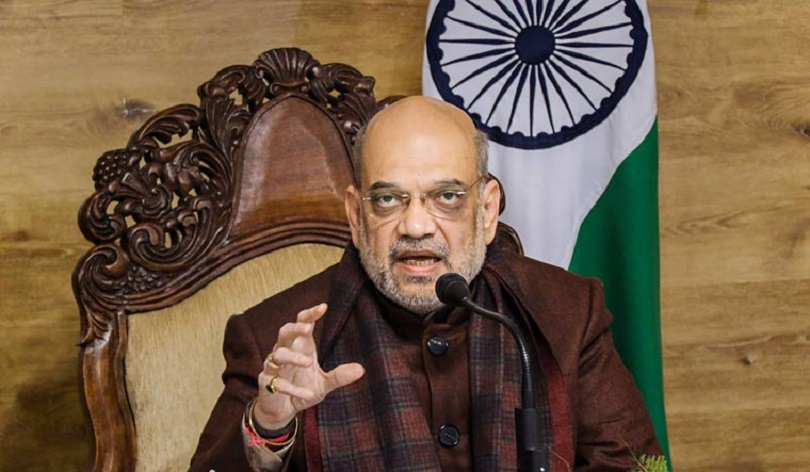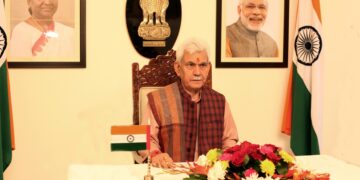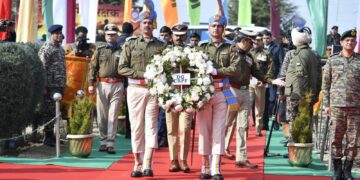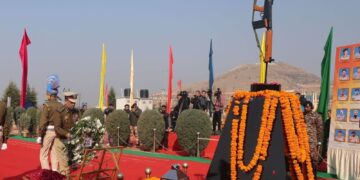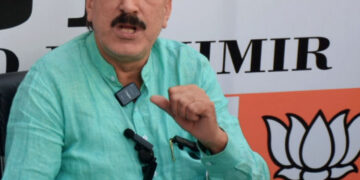By: Kunal Shrivatsava/Qayoom Naik
Jammu/Srinagar: A six member cabinet, headed by Omar Abdullah took over the reins of “power” in Jammu and Kashmir Union Territory today.
The formation was unique, surprising with a master stroke – designating Sunil Choudhary as Deputy CM, an attempt to unarm BJP in Jammu, the party thast couldn’t offer anything to the region post-2019.
So, a master stroke!
Have a look…
The giant killer
 Considered to be a giant killer after an emphatic win over his arch-rival president of Bharatiya Janta Party (BJP) J&K unit Ravinder Raina from Nowshera Constituency in the recently held Assembly elections, Surinder Kumar Choudhary of the National Conference (NC), made history today when he took oath as the new Deputy Chief Minister of Jammu & Kashmir Union Territory.
Considered to be a giant killer after an emphatic win over his arch-rival president of Bharatiya Janta Party (BJP) J&K unit Ravinder Raina from Nowshera Constituency in the recently held Assembly elections, Surinder Kumar Choudhary of the National Conference (NC), made history today when he took oath as the new Deputy Chief Minister of Jammu & Kashmir Union Territory.
In his early days, Surinder Kumar Choudhary, 56, was an employee at the Sher-e-Kashmir University of Agricultural Sciences and Technology of Jammu (SKUAST-Jammu), where he headed a unit of the NC’s Mazdoor Union. Later he resigned from the University and formally joined the political arena.
Though Choudhary remained associated with the National Conference in the initial political journey, his first party to enter poll fray was the Bahujan Samaj Party (BSP) as he contested his maiden Assembly election from Nowshera in 2008, getting a handsome tally of 12,186 votes. He stood third and narrowly missed the runner up spot by just 505 votes.
By the time of the next Assembly elections in 2014, he was a Peoples’ Democratic Party (PDP) candidate from Nowshera and lost to the BJP’s Ravinder Raina by 9503 votes. Afterwards the PDP made him an MLC.
Then, in 2024 Assembly elections, he joined the electoral fray as an NC candidate. He defeated J&K BJP chief Ravinder Raina by a healthy margin of 7,819 votes thereby taking a sweet revenge on his counterpart.
Kashmir’s Sheerni
 Known as the Sheerni (Lioness) of JKNC, Sakina Itoo has served as cabinet minister of the erstwhile state of Jammu and Kashmir. She has also served as minister for several departments, including Social Welfare, ARI Trainings and Public Grievances, Education, Tourism, Floriculture, Public Works, and PHE among others. She is one of the youngest members of the Jammu and Kashmir Legislative Assembly. She was only 26 years old when she won her first assembly election in 1996. She won the “Best MLA Award” in 2012 for her contribution to her constituency.
Known as the Sheerni (Lioness) of JKNC, Sakina Itoo has served as cabinet minister of the erstwhile state of Jammu and Kashmir. She has also served as minister for several departments, including Social Welfare, ARI Trainings and Public Grievances, Education, Tourism, Floriculture, Public Works, and PHE among others. She is one of the youngest members of the Jammu and Kashmir Legislative Assembly. She was only 26 years old when she won her first assembly election in 1996. She won the “Best MLA Award” in 2012 for her contribution to her constituency.
Her father, Wali Mohammad Ittoo was a senior NC leader and had served as the speaker of the J&K state Assembly. He was killed by terrorists in Jammu outside a Jama Masjid.
Following her father’s murder, she emerged as the tallest NC leader from south Kashmir and has been winning her constituency without a break.
Dark Horse
 Javid Ahmad Dar having a political legacy, holds an MBA from Pune University, which he completed before embarking on his political career.
Javid Ahmad Dar having a political legacy, holds an MBA from Pune University, which he completed before embarking on his political career.
Javid Ahmad Dar began his political journey in 2002 with the Peoples Democratic Party (PDP) under the leadership of the late Mufti Mohammad Sayeed. His entry into politics marked a new chapter for Rafiabad, as he quickly became a key figure in the constituency. However, after six years with the PDP, Dar decided to switch political allegiances. In 2008, he joined the Jammu & Kashmir National Conference (JKNC) in a significant move that was sealed in the presence of party patriarch Dr. Farooq Abdullah.
The timing of his shift was crucial. It coincided with the assembly elections, where Dar surprised many by securing a decisive victory over his former party leader, Dilawar Mir, in Rafiabad. This victory was not just political but personal, marking the start of a new era for Dar in the political landscape of the region.
Following his victory in 2008, Dar was appointed to key ministerial portfolios in the Jammu & Kashmir government. His roles included Minister of Roads and Buildings, Horticulture, Health, and Education. His work, particularly in the Roads and Buildings department, was well-received, and he quickly gained a reputation for his dedication to improving infrastructure in the region.
Despite his early successes, Dar faced a significant setback in 2014. In that year’s assembly elections, a strong wave of support for the PDP saw him lose his seat to Yawar Dilawar Mir, the son of the influential PDP leader Dilawar Mir.
After a 10-year hiatus, during which assembly elections were not held in Jammu and Kashmir, Dar made a triumphant return to politics in the latest elections. Running once again from Rafiabad on a JKNC ticket, he secured a resounding victory, defeating his former rival Yawar Mir by a margin of 9,202 votes. This victory marked Dar’s political resurgence and positioned him as a key leader in the region.
Old warhorse
 One of the National Conference’s (NC) old warhorses having served the party for more than two decades, the seasoned politician Javed Ahmed Rana has the unique distinction of representing Mendhar (ST) Assembly Constituency in Poonch district thrice in the last 22 years.
One of the National Conference’s (NC) old warhorses having served the party for more than two decades, the seasoned politician Javed Ahmed Rana has the unique distinction of representing Mendhar (ST) Assembly Constituency in Poonch district thrice in the last 22 years.
Javed Ahmed Rana, 61, who took oath as a cabinet minister today in the newly formed government led by Omar Abdullah, began his political journey in 1996 when he entered the electoral fray for the first time as an independent candidate from Mendhar Assembly segment.
However, he lost the election to Nisar Ahmed Khan of the NC by a narrow margin of 2460 votes. He polled 14256 votes while his winning opponent from the NC got 16716 votes. Though failed in his maiden attempt in the electoral battle, Rana made a strong entry into the world of politics.
In the next Assembly elections of 2002, Rana contested from Mendhar Assembly Constituency as a NC nominee and this time around he emerged victorious as he defeated an independent candidate Sardar Rafiq Hussain Khan by a margin of 7865 votes. Rana polled 24530 votes while his rival Khan could muster only 16665 votes.
However, in 2008, Sardar Rafiq Hussain Khan, who had by now joined the People’s Democratic Party (PDP) turned the table and managed to register a win by a thin margin of 742 votes over his nearest rival Javed Ahmed Rana of the NC. Rana got 28294 votes while the winner candidate Khan polled 29036 votes.
Rana again won the seat in 2014 when Jammu and Kashmir was still a state. Rana, who secured 31,186 votes, won the seat with a margin of 9,025 votes. He defeated PDP candidate Advocate Maroof Ahmad Khan who got 22,161 votes.
Rana won the Mendhar seat for the third time in the Assembly polls of 2024.
He garnered 32,176 votes, to be precise 14,906 more than the Bharatiya Janta Party’s Murtaza Ahmed Khan, who finished second.
The Young Turk
 Satish Sharma, 42, a familiar name in the political arena of Jammu region, is the son of two-time Member of Parliament (2004 to 2014) from Jammu-Poonch Lok Sabha seat, two-time MLA from Chhamb (won in 1987) and Akhnoor (won in 2002) respectively and a cabinet minister in the erstwhile Congress-Peoples Democratic Party (PDP) coalition government, Madan Lal Sharma.
Satish Sharma, 42, a familiar name in the political arena of Jammu region, is the son of two-time Member of Parliament (2004 to 2014) from Jammu-Poonch Lok Sabha seat, two-time MLA from Chhamb (won in 1987) and Akhnoor (won in 2002) respectively and a cabinet minister in the erstwhile Congress-Peoples Democratic Party (PDP) coalition government, Madan Lal Sharma.
Young, dynamic and highly educated, Satish Sharma has a BA LLB degree along with a MBA degree from University of Wales Institute, Cardiff (United Kingdom), which he attained in 2008. He also worked briefly in the United Kingdom before he returned to India following his father’s failing health.
Satish Sharma’s decision to contest as an independent came within a few hours after Congress denied him the mandate and fielded its veteran leader and ex-Deputy Chief Minister Tara Chand from the Chhamb Assembly Constituency.
Satish Sharma was claiming the ticket from Chhamb Assembly Constituency on the grounds that now the seat is open and he has every right to contest. However, Tara Chand, who belonged to a reserve category, was adamant to contest only from Chhamb.
Contesting as an independent candidate, Satish Sharma ultimately proved his mettle in the electoral battle of 2024 as he defeated not one but two seemingly much more powerful opponents including a former Bharatiya Janta Party (BJP) MLA Rajeev Sharma and ex-Deputy Chief Minister Tara Chand of the Congress.

